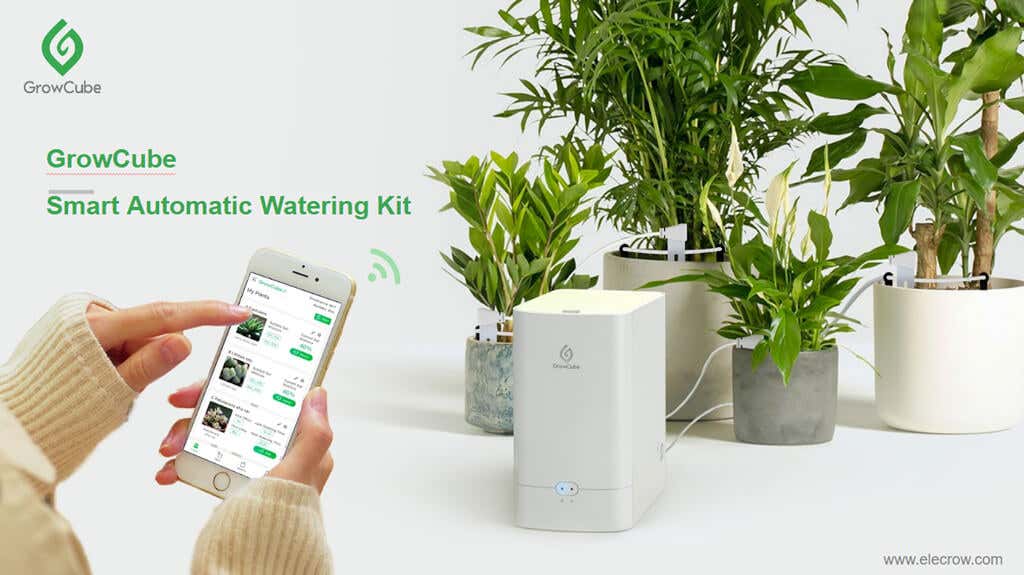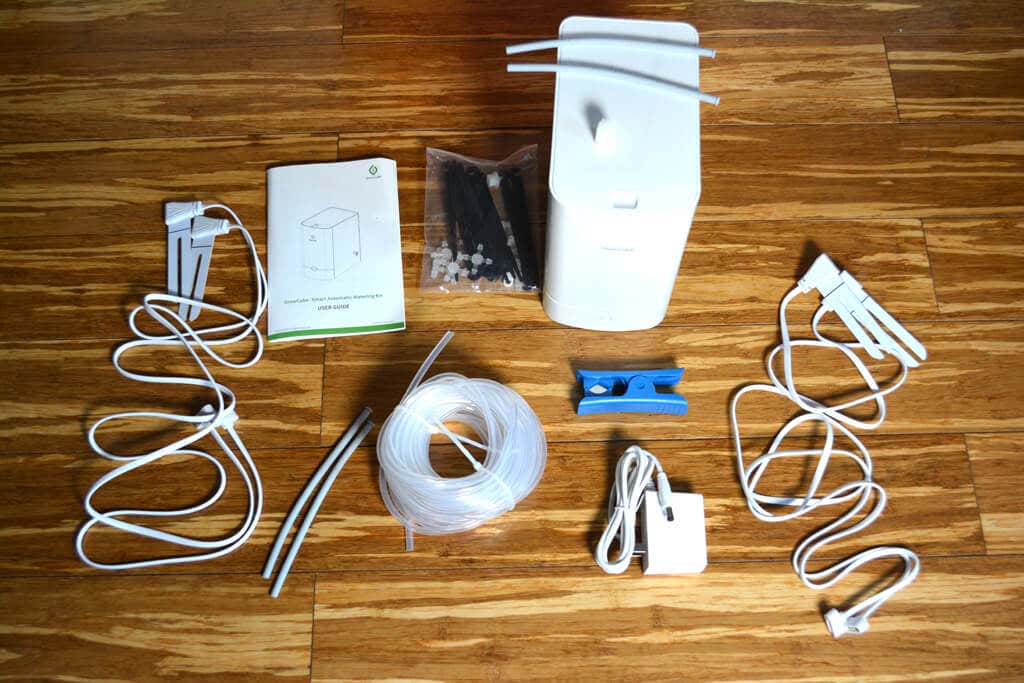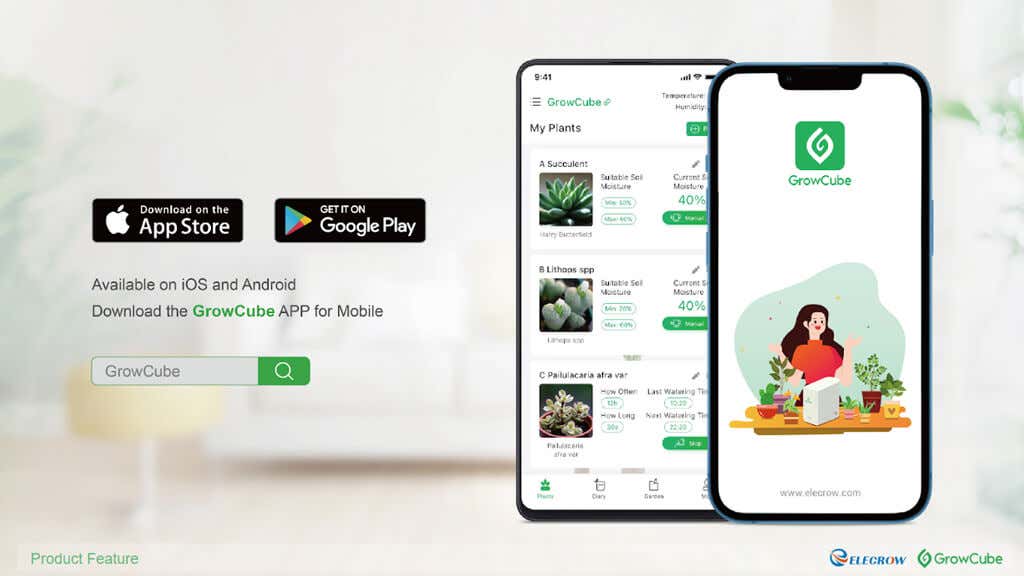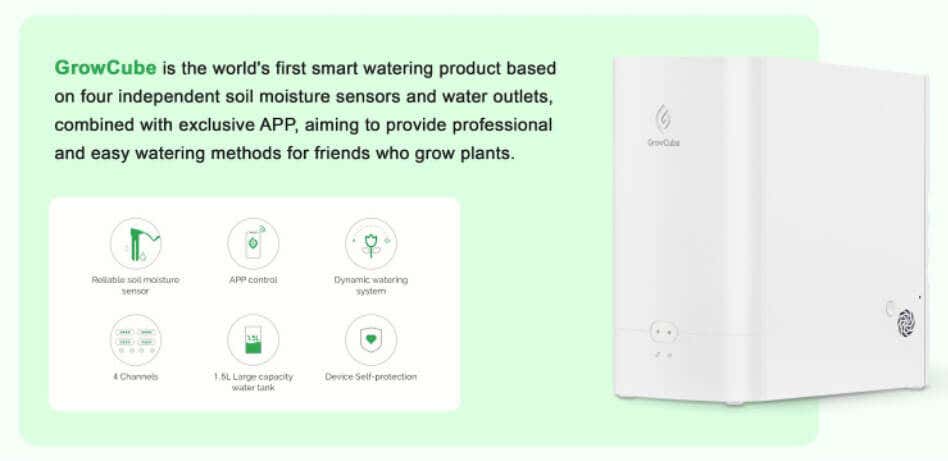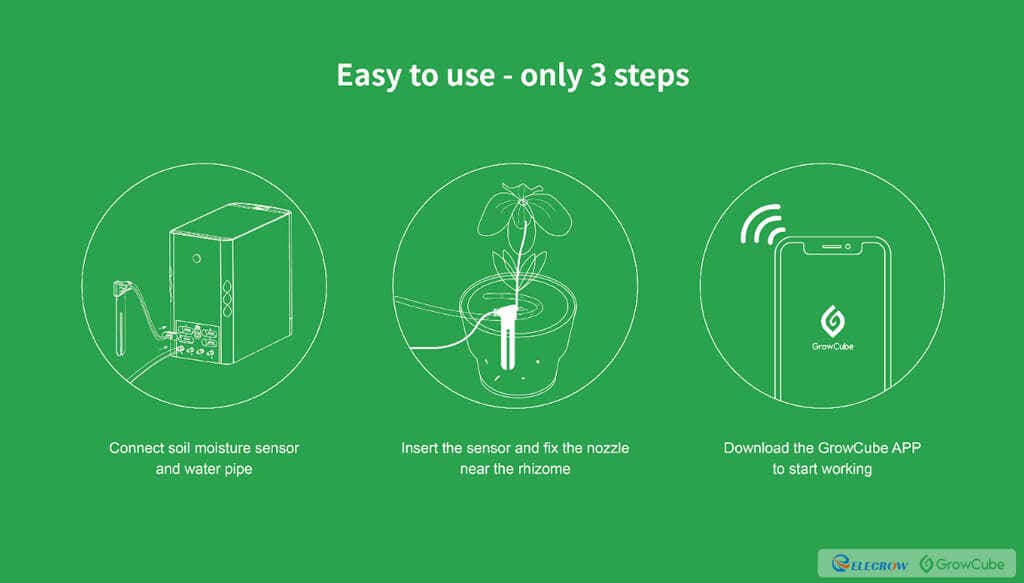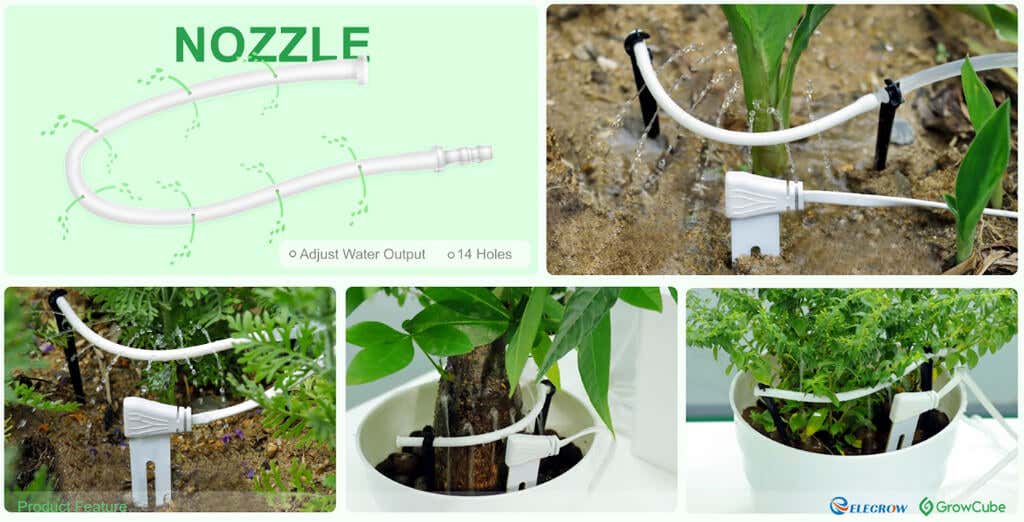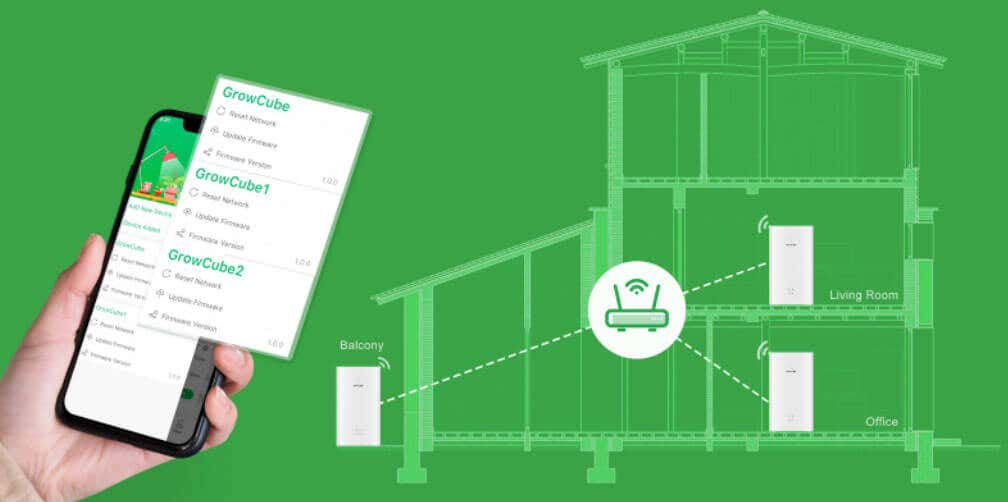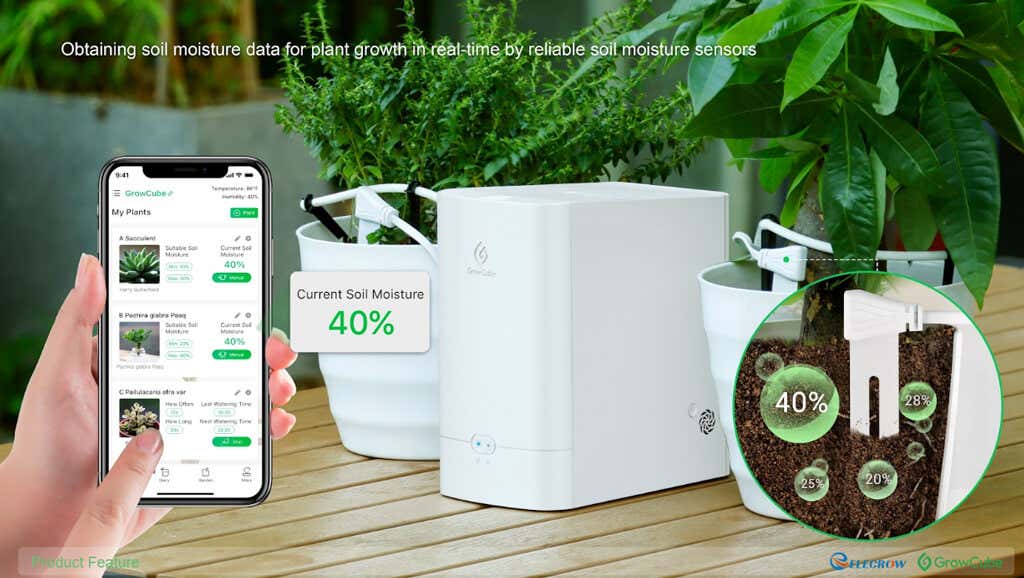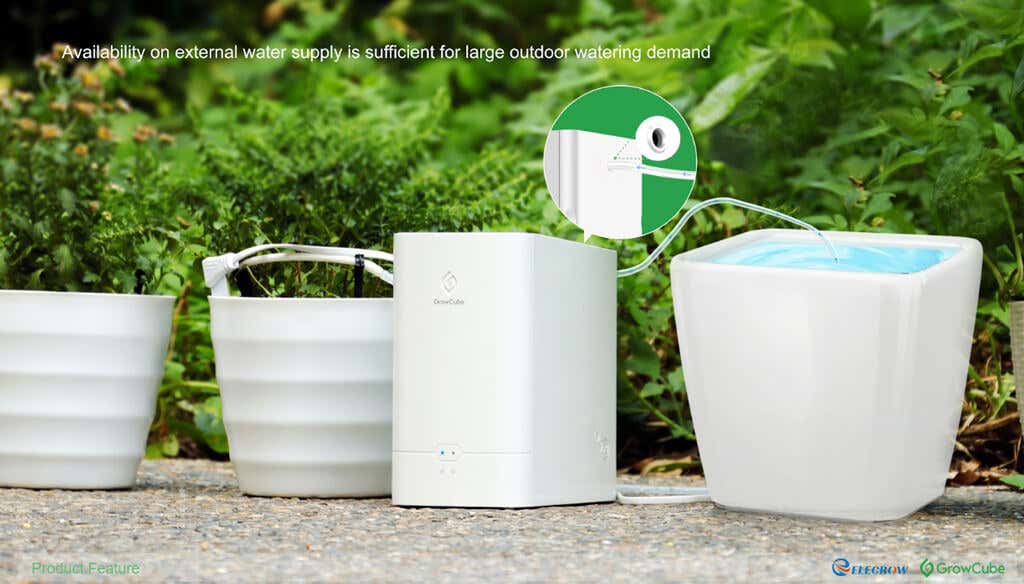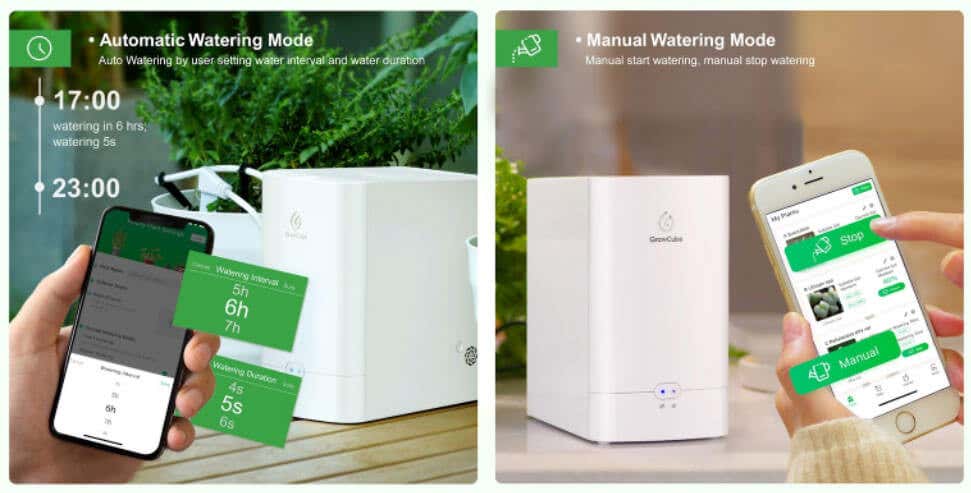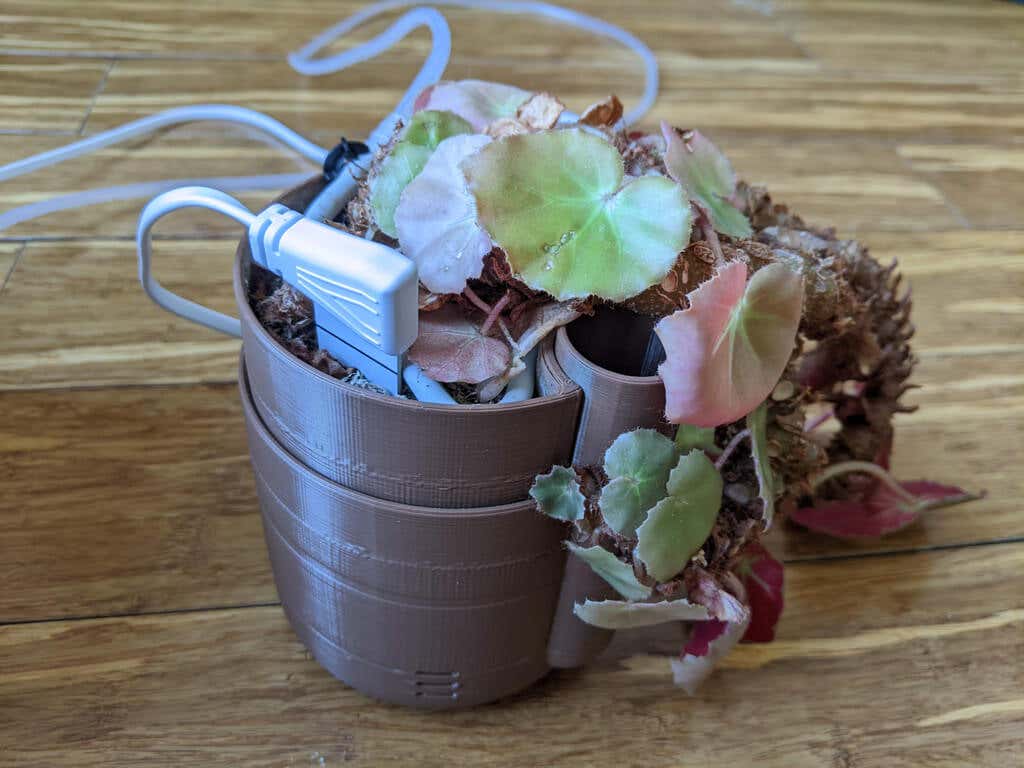The folks over at Elecrow are launching a Kickstarter for their newest product, the GrowCube. GrowCube is a “smart automatic watering kit” that uses moisture sensors connected to the GrowCube app that alert you when your plant needs water. The GrowCube will water up to four of your plants automatically.
You might remember Elecrow from our review of the CrowPi2, a Raspberry Pi laptop that includes a bewildering array of features for gaming, coding, and creating interactive electronic objects. Elecrow clearly has some creative engineers working for them, and they’ve come up with another innovative product.
We had the opportunity to try the GrowCube to see if it measures up to the hype. We’ll walk you through what the GrowCube does, what you’ll get if you buy one, and our thoughts on its quality and performance.
What Comes in the GrowCube Box?
Inside the GrowCube package, you’ll find:
- 1 GrowCube
- 4 soil moisture sensors
- 4 nozzles
- 1 water tube 10m in length
- 1 filter head
- 12 brackets
- 1 water tube cutter
- 1 power adapter
- 1 user manual
The GrowCube itself is 180x170x100 mm and takes a 12V/2A power supply. The water tank can hold up to 1.5 liters, which Elecrow says should be enough for 15 days for four pots of plants.
You’ll also want to download the GrowCube app, available for both iOS and Android.
What Does the GrowCube Do?
In a world where Internet of Things devices are becoming increasingly common, we constantly ask ourselves, “Does this object really need to be connected to the internet?” For the GrowCube, the answer is a resounding, “Yes!” While you can use the GrowCube without an internet connection, you’ll want to connect it to the internet to get the most out of this product.
The GrowCube essentially does four things:
- Provides data on the moisture level of your plants’ soil.
- Automatically waters plants with the appropriate amount.
- Records data on soil humidity, watering operations, and environmental temperature in a plant diary.
- Gives you access to a massive database of information on plants and plant maintenance.
How to Use the GrowCube
The initial setup for the GrowCube is fast and easy. After installing the filter inside the tank, connect one of the soil moisture sensors to the back of the GrowCube. Put the other end into the soil. The user manual gives some tips and tricks for the best placement of the soil moisture sensors.
Next, cut the water tube to the right length. It should reach from the plant to the GrowCube. Then connect the nozzle to the water tube and place the nozzle at the base of the plant. You’ll want the water that comes out of the nozzle to reach your plant’s roots, so place it at soil level near the stem. Make sure the tiny holes in the nozzle are facing downward, into the soil. Otherwise, the water will spray out of the pot. You can use the brackets to help position the nozzle.
Once the sensors and nozzles are placed, fill the GrowCube tank with water and turn on the power supply. You’ll see red and blue lights flashing alternately. That means the GrowCube is waiting for you to configure the network.
Install the App and Choose a Connection Mode
The next step is to install the GrowCube app on your iOS or Android device. GrowCube has two modes: Direct Connection Mode and Networking Mode. They recommend Networking Mode which connects to your wifi network. If you use Networking Mode, you’ll be able to add multiple GrowCubes and monitor them all via the app.
If you don’t have WiFi, you can use Direct Connection Mode, which allows the phone to connect directly to the GrowCube. If you use Direct Connection Mode, though, your phone won’t be connected to the internet over WiFi. That’s why we chose Networking Mode.
We didn’t have any trouble setting up Networking Mode via the GrowCube app. It was equally easy to add plants to the app. You can give a nickname to each plant connected to the GrowCube. Enter information about each plant into the app, and GrowCube will automatically add information from its database about the plant, like the optimal soil moisture level. If it can’t find the plant in its database, you can manually enter the desired soil moisture range.
Once you’ve added your plants to the GrowCube app, you can sit back, confident that your plants will be watered the correct amount. When the water level gets low, the app will display a reminder to refill the tank. The app will also alert you if any of the water tubes are blocked or if any of the sensors are disconnected.
Add an External Water Supply
The GrowCube includes a few advanced features we think will be really useful. If the water tank isn’t big enough for your plants, you can connect the GrowCube to an external water supply.
How Does the GrowCube Perform?
Overall, the GrowCube appears to be a quality product, especially the tubing, which is good because that’s the most likely place for the whole system to fail. We suspect the tubing is made of silicone. With lesser-quality tubing, you’d have to heat it up to ensure it wouldn’t leak. There’s no need for that with the GrowCube. Furthermore, the water tube cutter works really well.
The hardest thing about setting up the GrowCube is making sure the tiny holes on the nozzle are facing into the soil.
The connectors on the back of the GrowCube are magnetic plugs. There is a notch on the connector so it only works one way. You’ll know immediately if you put it in the wrong way. The magnetic connector also means that if the cord gets yanked out, the GrowCube itself won’t fall over, spilling water.
The automatic watering system did exactly what it says it’ll do, and after using it for a week, our plant looked healthier than ever. It’s quite possible that we weren’t watering it enough before, and GrowCube has corrected that.
Overall, we like the GrowCube. At the very least, we’ll use it to keep a few plants watered while we’re out of town. Not everyone will want all those tubes and sensor cords to be visible among their plants, not to mention the GrowCube itself, but if you don’t mind that, get this product.
Related Posts
- Tribit StormBox 2: The Under $70 Portable Speaker that Stands Out
- ENGWE L20 2.0 Review: The Best Budget-Friendly Foldable E-Bike?
- TopDon TC004 – a Thermal Imaging Camera That Will Give You Predator Vision
- Newyes Portable Wireless Thermal A4 Printer Review
- Eskute Star Folding Fat Tire Electric Bike Review
